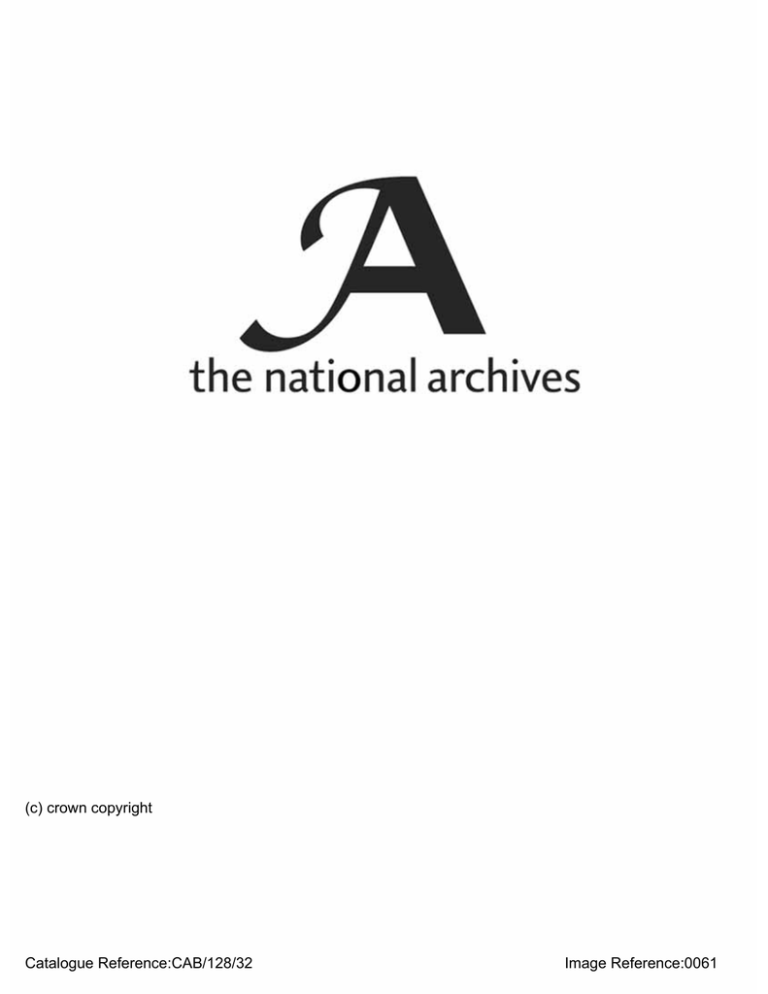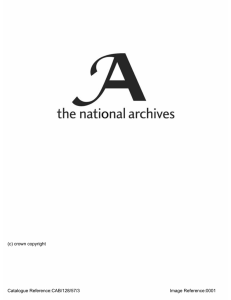(c) crown copyright Catalogue Reference:CAB/128/32 Image Reference:0061
advertisement

(c) crown copyright Catalogue Reference:CAB/128/32 Image Reference:0061 Printed for the Cabinet. July 1958 C C . (58) 61st Conclusions Copy No. CABINET ' CONCLUSIONS of a Meeting of the Cabinet held in the Prime Ministers House of Commons, S.W. 1, on Monday, 21st July, 1958 at 4 p.m. Room, Present: The Right Hon. H A R O L D M A C M I L L A N , M.P., Prime Minister. The Right Hon. R. A. B U T L E R , M.P., The Right Hon. V I S C O U N T K I L M U I R , Lord Chancellor. Secretary of State for the Home Department and Lord Privy Seal. The Right Hon. S E L W Y N L L O Y D , Q . C , The Right Hon. D. H E A T H C O A T A M O R Y , M.P., Chancellor of the Exchequer. M.P., Secretary of State for Foreign Affairs. The Right Hon. The E A R L O F H O M E , The Right Hon. A L A N L E N N O X - B O Y D , M.P., Secretary of State for the Secretary of State for Commonwealth Colonies. Relations. The Right Hon. J O H N M A C L A Y , M.P., The Right Hon. V I S C O U N T H A I L S H A M , Q.C., Lord President of the Council. Secretary of State for Scotland. The Right Hon. D U N C A N S A N D Y S , M.P., The Right Hon. I A I N M A C L E O D , M.P., Minister of Labour and National Minister of Defence. Service. The Right Hon. L O R D M I L L S , Minister The Right Hon. H A R O L D W A T K I N S O N , M.P., Minister of Transport and Civil of Power. Aviation. The Right Hon. G E O F F R E Y L L O Y D , The Right Hon. J O H N H A R E , M.P., Minister of Agriculture, Fisheries and M.P., Minister of Education. Food. Dr. The Right Hon. C H A R L E S H I L L . The Right Hon. R E G I N A L D M A U D L I N G , M.P., Paymaster-General. M.P., Chancellor of the Duchy of Lancaster. Also present: The Right Hon. E D W A R D H E A T H , M.P., Parliamentary Secretary, Treasury. Secretariat ' The Right Hon. Sir N O R M A N 53860-3 Mr. B. S T . J. Mr. J. M. TREND. WILSON. BROOK. CONTENTS Middle East Meeting of H e a d s of Governments. Jordan. Civil A v i a t i o n . Middle East. (Previous Reference: C.C. (58) 60th Conclusions, Minute 1.) Meeting of H e a d s of Governments. C.C. 61 (58) *The Foreign Secretary informed the Cabinet that, during his visit to Washington, he had discussed with the United States Government the letter of 19th July from Mr. Kruschev proposing that a conference of Heads of Governments of the United States, the United Kingdom, the Soviet Union, France and India should be convened at Geneva on 22nd July in order to consider means of bringing to an end the military conflict in the Middle East. It was unfortunate that the French Government had accepted this proposal in principle. The United States Government had taken strong exception to the offensive tone of Mr. Kruschev's letter and would prefer that a special meeting of the Security Council should be summoned, attended by Heads of Governments, to discuss the situation in the Middle East. This proposal, which would be acceptable to the Secretary-General of the United Nations, would have the advantages that informal and private discussions between the Heads of Government could be arranged in the intervals between meetings of the Council and that, under the procedure applicable to a special session of the Council, countries, such as India, who were not members of the Council could, if necessary, be invited to be present. Moreover, the fact that the discussions would take place within the framework of the United Nations would enable them to be followed up, in the normal manner, after the special meeting of the Security Council was adjourned; and it would be preferable to secure this appearance of continuity rather than to accept the risk that a separate meeting of Heads of Govern­ ments might be seen to break up after a few days without reaching any firm decisions. The United Kingdom Representative at the United Nations might be instructed to support the United States Representative in recommending this proposal to the Security Council that afternoon. Thereafter, it would be advisable that the Prime Minister should reply to Mr. Kruschev indicating that it constituted our reply to his letter. In discussion there was general support for this course of action, which should retain the initiative in the hands of the West. It was suggested that it might be desirable for the Governmenfs intentions to be announced by a Ministerial statement before the adjournment of the House of Commons that night or possibly during the course of the following day. Alternatively, a statement might be issued by the Prime Minister later in the evening when confirmation had been received that the proposal had been made by the United States Government, and supported by ourselves, in the Security Council. On the other hand, a Parliamentary debate on foreign affairs had already been arranged for the following day and there would be some advantage in deferring until then a considered statement about the lines on which the Governments of the United Kingdom and the United States proposed to reply to Mr. Kruschev's letter. The Governmenfs spokesmen in the debate would then be able to take account of the reactions of the Security Council and of world opinion to the proposal of the United States Government. In the interim appropriate guidance could be given to the Press. The C a b i n e t ­ (1) Invited the Foreign Secretary to instruct the United Kingdom Permanent Representative at the United Nations to support the proposal, to be put forward by the United States Representative in the Security Council, that a special meeting of the Council should be convened in the near future to discuss means of resolving the conflict in the Middle East. (2) Invited the Chancellor of the Duchy of Lancaster, in consultation with the Foreign Secretary, to ensure that appropriate guidance was provided to the Press that evening about our reasons for supporting this proposal. The Prime Minister informed the Cabinet that the Government of Israel, having acquiesced in the over-flying of Israel involved in the original despatch of British troops to Jordan, were now raising objections to the continued over-flying of their territory by British transport aircraft carrying supplies to those forces. The possibility of establishing an alternative supply route through Aqaba was being examined. But this would inevitably take some little time. Mean­ while we were taking all possible measures to reduce the frequency of our sorties; and, since the Government of Israel appeared to accept the flight of United States aircraft over their territory, we were asking the Government of the United States to implement their undertaking to afford the maximum of logistical support to our troops in Jordan. Jordan. Civil Aviation. The Cabinet— (3) Took note of this statementThe Minister of Transport and Civil Aviation said that the British Overseas Airways Corporation had been advised to avoid flying over Syria and Iraq during the last few days. But, if they continued to use a more circuitous route, they would lose traffic to their competitors; and he therefore proposed to inform them that they might now resume flights over Syria and Iraq. The Cabinet— (4) Authorised the Minister of Transport to inform the British Overseas Airways Corporation that their commercial flights over Syria and Iraq might now be resumed. Cabinet Office, S.W.1, 21st July, 1958.



